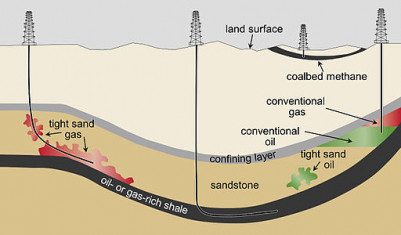
Conférence : Environmental monitoring of unconventional oil and gas wells

M. Daniel Soeder du South Dakota School of Mines and Technology et anciennement du US Department of Energy (DOE) viendra donner une conférence le mardi 19 septembre à 11h00 au local 2422 sur le suivi environnemental de réservoirs non conventionnels gaziers et pétroliers.
--
Titre : Environmental monitoring of unconventional oil and gas wells
Daniel J. Soeder, Director, Energy Resource Initiative, Department of Geology and Geological Engineering, South Dakota School of Mines and Technology, Rapid City, South Dakota 57701, USA
Concerns about the potentially detrimental environmental effects of the hydraulic fracturing (“fracking”) process employed to recover shale gas and tight oil from unconventional reservoirs are largely based on uncertainty and the amplification of a small number of incidents in the media. The lack of field monitoring data is driving unsupported arguments on both sides of the debate, allowing proponents to insist that there is no evidence showing that fracking is dangerous for the environment, while opponents point out that there are no data to indicate that it is safe, either. Over the past decade, shale gas development in the United States and Canada has proceeded largely without incident, but other nations seeking to develop shale resources have remained cautious due to the ongoing uncertainties.
Attempts at environmental monitoring have almost all have been retrospective studies performed after an incident occurred. Far fewer prospective studies have been done where environmental monitoring begins prior to shale gas development to define baseline conditions, and then continues throughout the drilling and fracking process, and for some time afterward. Cooperation with the drilling industry is essential to secure site access, and obtain knowledge about drilling schedules, fracking operations, and site layout to establish monitoring locations. Industry has been resistant to such cooperation, fearing it could lead to new regulations, the discovery of contaminants that require expensive remediation, or cause delays in production that could affect revenue.
The primary environmental concerns related to shale gas development are 1) wellbore integrity issues and the potential escape of stray gas into the air or shallow aquifers, and 2) potential groundwater contamination from spills or leaks of chemical additives used in the fracking process, many of which are new, proprietary, and have not been investigated for natural attenuation pathways or breakdown rates. Both laboratory and field-based studies are needed to reduce uncertainty in the potential environmental risk of producing hydrocarbons from shales.
Au plaisir de vous y voir!
Photo : US Government employee [domaine public], via Wikimedia Commons
